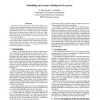Free Online Productivity Tools
i2Speak
i2Symbol
i2OCR
iTex2Img
iWeb2Print
iWeb2Shot
i2Type
iPdf2Split
iPdf2Merge
i2Bopomofo
i2Arabic
i2Style
i2Image
i2PDF
iLatex2Rtf
Sci2ools
116
click to vote
ISSS
1995
IEEE
1995
IEEE
Scheduling and resource binding for low power
Decisions taken at the earliest steps of the design process may have a significantimpact on the characteristics of the final implementation. This paper illustrates how power consumption issues can be tackled during the scheduling and resource-binding steps of high-level synthesis. Algorithms for these steps targeting at low-power data-paths and trading off, in some cases, speed and area for low power are presented. The algorithms focus on reducingthe activity ofthe functional units (adders, multipliers) by minimizing the transitions of their input operands. The power consumption of the functional units accounts for a large fraction of the overall data-path power budget.
Related Content
| Added | 26 Aug 2010 |
| Updated | 26 Aug 2010 |
| Type | Conference |
| Year | 1995 |
| Where | ISSS |
| Authors | Enric Musoll, Jordi Cortadella |
Comments (0)

